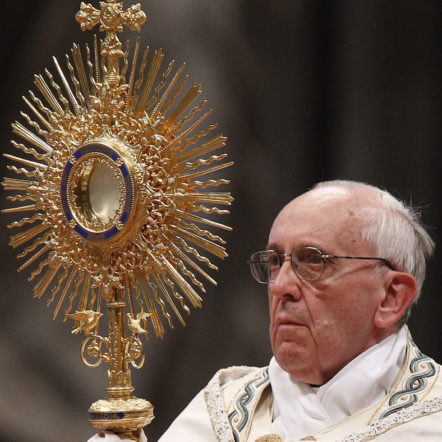“Could you not watch one hour with Me?” (Matthew, 26:40)
With the vacation season in full swing, so many people in the northern hemisphere choose to expose their bodies to the direct rays of the sun. Sadly, so few decide to expose their souls to the Divine Rays which heal us from inside out.
Regrettably, the findings of a 2019 Pew research survey shows that one in five US Catholics believe in transubstantiation despite awareness of the Church’s teaching. It therefore comes as no surprise that in some places the practice of Eucharistic adoration has been almost completely abandoned.
On June 18, 2021, Auxiliary Bishop Andrew Cozzens of St. Paul and Minneapolis and chair of the bishops’ evangelization committee, introduced the program to his fellow bishops aiming to support and “start a fire” of devotion to the Eucharist. According to CNA, the prelate repeatedly underlined the importance of spreading the practice of Eucharistic adoration, especially since he had noticed the positive effect that adoration continues to have on young people.
The Catechism of the Catholic Church teaches us that, “Adoration is the first attitude of man acknowledging that he is a creature before his Creator. It exalts the greatness of the Lord who made us and the almighty power of the Savior who sets us free from evil. Adoration is homage of the spirit to the “King of Glory,” respectful silence in the presence of the “ever greater” God. Adoration of the thrice-holy and sovereign God of love blends with humility and gives assurance to our supplications.” (CCC 2628)
In 1981, Pope St. John Paul II started Perpetual Eucharistic Adoration of the Most Blessed Sacrament in the Vatican. The Eucharist and adoration progressively became the fulcrum of his life and the soul of his pontificate. In fact, he would spend long periods of time in the Presence of the Lord, often prostrate, particularly before any missionary trip he would undertake. In his teaching, he often made explicit reference to Eucharist adoration – “It is the responsibility of Pastors to encourage, also by their personal witness, the practice of Eucharistic adoration, and exposition of the Blessed Sacrament in particular, as well as prayer of adoration before Christ present under the Eucharistic species.” (Ecclesia de Eucharisia, 25)
For centuries, through frequent visits to the Most Blessed Sacrament, countless numbers of saints and blesseds drew strength to suffer superhuman trials and accomplish extraordinary deeds, and received graces for themselves and others.
These holy persons encourage us to go to Adoration:
Saint Alphonsus Liguori (†1787) – “Know also that you will probably gain more by praying fifteen minutes before the Blessed Sacrament than by all the other spiritual exercises of the day. True, Our Lord hears our prayers anywhere, for He has made the promise, ‘Ask, and you shall receive,’ but He has revealed to His servants that those who visit Him in the Blessed Sacrament will obtain a more abundant measure of grace.”
Saint John Vianney (†1859) – “If we really love the good God, we should make it our joy and happiness to come a few minutes to adore Him, and ask Him for the grace of forgiveness. We should regard those moments as the happiest in our lives.”
Saint Faustina Kowalska (†1938) – “+ April 2, 1937. In the morning, during Mass, I heard these words: Tell the Superior that I want adoration to take place here for the intention of imploring mercy for the world..” (1070 Diary)
Saint Teresa of Calcutta (†1998) – “The time you spend with Jesus in the Blessed Sacrament is the best time that you will spend on earth. Each moment that you spend with Jesus will deepen your union with Him and make your soul everlastingly more glorious and beautiful in heaven, and will help bring about an everlasting peace on earth.”
It is no secret to anyone that huge swaths of American society have fallen into moral decay because of a refusal to acknowledge a moral law. The mainstream media are dutifully providing constant reporting that we are more at risk than ever from the inevitable Delta, Omega, or Theta virus mutations. This propaganda fear is crippling millions of people, threatening whole countries with devastating lockdowns and continuous quarantines, and preventing the so keenly anticipated return to normalcy. To break the destructive spiral of anxiety and decadence, extraordinary measures must be implemented. One such measure is Eucharistic Adoration.
A devotion to the Most Blessed Sacrament underscores all cloistered religious communities, both contemplative or semi-contemplative, including the Benedictines, the Cistercians, the Discalced Carmelites, the Dominican Nuns, the Holy Adoration Sisters, the Sister Adorers of the Precious Blood, the Sisters of Children of Mary, the Poor Clares, and many other Catholic convents in the United States today of which the majority are the offshoots of the ones founded in Europe during the Middle Ages. Nuns often credit the practice of adoration with reconciling feuding neighbors and squabbling spouses. It is said that Mass attendance and vocations can increase with adoration and the renewal of Catholic family life is bound to plod along.
Ciudad Juarez, located in the state of Chihuahua in northern Mexico, was regarded from 2008 to 2010 as one of the most dangerous cities in the world, due to the constant struggles for power and territory between the cartels and drug trafficking violence. Fr. Patricio Hileman, a priest who is dedicated to establishing adoration chapels throughout Latin America, claims that Eucharistic adoration is partly responsible for a drop in the number of homicides from 3,766 in 2010, to 265 in 2015. “When a parish adores God day and night, the city is transformed,” Fr. Hileman said.
I enjoy adoring the Host and find it spiritually enriching. Daily Eucharist adoration nourishes our love and charity, gives light to the mind and strength to the will, and finally releases us from unfounded fear and trepidation. All in all it is more powerful than you can possibly imagine. I believe that the combined power of adoration and the Rosary can be compared to a spiritual explosive that Our Lord has given us to destroy the strongholds of evil and make America holy.
Eucharistic adoration is a long-standing Catholic tradition that fell into disuse. Thus, we all are invited to return to our core values. Taking time out of our busy schedules to spend a Holy Hour with Jesus is something that will certainly bear fruit. If your US parish does not have perpetual adoration, you might go to http://www.therealpresence.org/states/perp.htm and choose your state and click to see on the map its precise location. Participating in online adoration is never a replacement for Eucharistic adoration in person.
To close, let’s reflect on the instruction received from Jesus by contemporary Polish mystic and stigmatic, Alicja Lenczewska (+2012), “I desire adoration not for myself, but to heal the deepest parts of your soul where every thought pops up, every word and every act [comes to life] – every reaction sparks off.” (Testimony, 837)
May a fire of love and reverence for the Eucharist blaze in the hearts of all bishops, priests and deacons, spread throughout dioceses, parishes and families, and prepare the Country for His final coming. God bless America. Amen.





